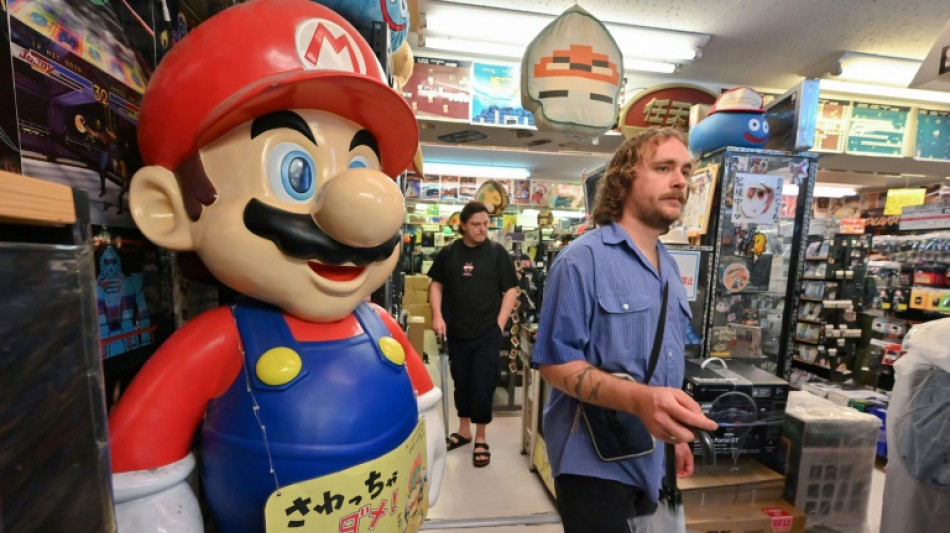

Japan is next level for retro game collectors
US tourist David Madrigal is over the moon after paying $200 for a "vintage" console at a busy Tokyo store that is tapping into booming global demand for retro gaming kit.
"When I came into this store, I was like a kid walking into a candy shop," Madrigal, 23, told AFP at Super Potato in the Akihabara district famous for its Japanese pop culture shops.
"This stuff is my passion. I love older consoles," he said. The PS Vita, a console released in 2011, that he bought "would usually cost me about $600 in the US."
Super Potato has three floors packed with Game Boy cartridges, Sega Dreamcast consoles wrapped in plastic and antiquated arcade machines where nostalgic customers can play "Street Fighter II" again.
Prices can be eye-watering. A handheld Nintendo Game & Watch electronic game from the 1980s -- featuring "Zelda" -- was priced at 250,800 yen ($1,750).
Around 70-80 percent of customers are foreign tourists, who have flocked to Japan in record numbers this year, store manager Komura, who only gave his surname, told AFP.
- Soul gaming -
Part of the appeal, Madrigal said, is that many modern games are a bit "more of the same" compared to ones when he was growing up.
"There was a different kind of innovation," he said. "Companies weren't afraid to think outside the box. They were willing to take risks."
Video game historian Hiroyuki Maeda said that additional demand from collectors comes from the fact that some consoles were marketed differently outside Japan.
Nintendo's Famicom and Super Famicom consoles for example were released abroad under alternative names, and with different and more colourful designs, he said.
"If you come to Japan and see a machine you've never seen before, you want to buy it. It stimulates the collector's soul," said Maeda, who has written dozens of books on gaming history.
"The definition of retro gaming varies, depending on the era that the people who engage in it are nostalgic for," Maeda told AFP.
- 'Super collector' -
Amid rice fields and lotus fields two hours north of Tokyo, Proudro (his online persona) has amassed a vast treasure trove of video game relics.
The "super collector" has stuffed an old building opposite his family home with several thousand vintage games and consoles, as well as arcade machines in full working order.
"The appeal of collecting retro games is really the nostalgia of childhood memories in games shops or spending time playing at friends' houses," the 50-year-old collector said.
"To be honest, I don't really play games," he added.
"Being surrounded by games, their sounds, their atmosphere, looking at them and dreaming, that's enough to keep me happy."
- Stuffed into bins -
Proudro has spent lavishly to build his collection.
Retro games can reach sky-high prices: a still-wrapped version of the game "Super Mario Bros.", released in 1985, sold in 2021 for $2 million.
Until the late 1990s, however, old games were virtually worthless, according to historian Maeda.
"They were crammed into bins in shops" and sold for as little as 10 yen (seven US cents today), he said.
Proudro says he travelled around Japan 20 years ago looking for collectables in toy shops and bookstores.
"There were often stocks of Super Famicom or Game & Watch in a corner, covered in dust. The elderly people who ran these shops would tell me to take them away to clear them out," Proudro said.
"As I work in vegetable wholesale, I would give them a crate of onions or potatoes, and everyone was happy.
"Today that would no longer be possible. These shops have disappeared, and with the internet, everyone has started to resell," he added.
Wanting to share his passion with others, Proudro founded an association of retro gaming enthusiasts and is delighted at the interest shown by people from around the world.
"But to be honest, I also think that Japanese products should stay in Japan. It's a bit like Japanese woodblock prints in the past, which were taken abroad where they were more appreciated, before being bought back by Japan," he said.
His country, he laments, "is slow to realise the value" of its works.
文-L.Wén--THT-士蔑報




